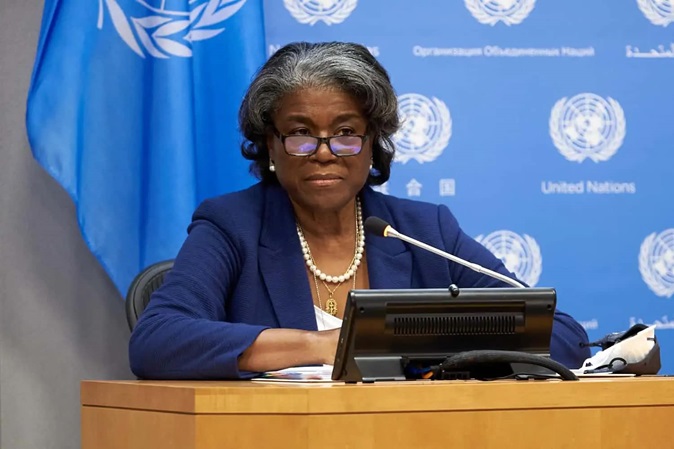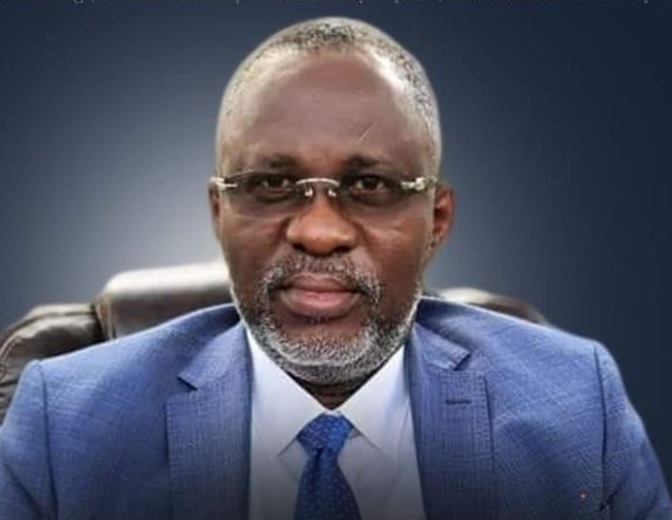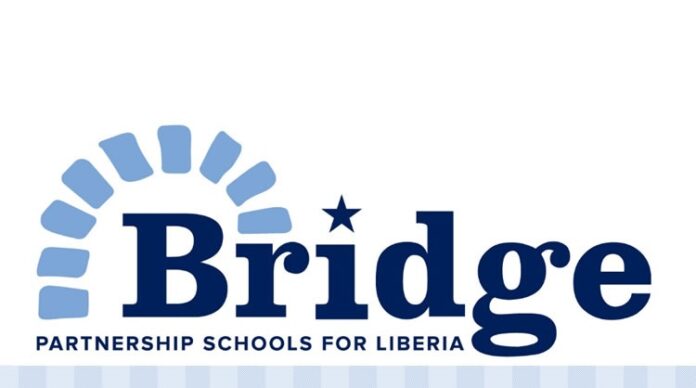Ambassador Linda Thomas-Greenfield
U.S. Representative to the United Nations
New York, New York DEFINED
March 31, 2022
AS DELIVERED
Defined Thank you so much, Abe, and thank you for welcoming all of us here today. I’m really honored to be among this esteemed group. It is also an honor for me to kick off this panel marking the 200-year commemoration of U.S.-Liberia ties. DEFINED
I don’t want to go any further without acknowledging our outstanding panelists, including many of my fellow former U.S. Ambassadors to Liberia: Ambassadors Blaney, Booth, Elder, and Malac, as well as our current Ambassador to Liberia, Michael McCarthy. Again, I feel so honored to among this esteemed group. And then, Ambassador McCarthy, you know I planned to be in Liberia in February, and I can tell you I was so excited about getting back there and I was so disappointed that I couldn’t make it, but it’s still on my agenda. I will look for an excuse to get back to Liberia at some point and look forward to meeting you there. Let me also thank Yale World Fellow and former Deputy Foreign Minister, Elias Shoniyin, for moderating this esteemed group.
So, on the 200th commemoration of U.S.-Liberia ties, we are marking a specific moment: a moment when free Black men, women, and children from the United States arrived in Providence Island. It’s important to remember the context that brought them here. They were leaving behind a country where slavery was legalized. But they were also pushed out, and I remind people all the time about that history. They were pushed out and pushed abroad, in part by the American Colonization Society, a racist organization with the express project of removing free Black people from America. But more importantly, they came also because they sought freedom.
It was a hard journey. And we should not romanticize it. People died on this trip. Others perished after arriving. And yet the ACS kept sending more free Black people away. When they arrived, they encountered the indigenous people of the land which sometimes led to more conflicts, with some new arrivals even inflicting some of the racist attitudes they had learned in the United States onto the indigenous population that they met. But racism wasn’t the only reason they left America, nor the only driver of their new life.
Those first people also made the arduous journey across the Atlantic for a reason memorialized on Liberia’s coat of arms: “the love of liberty brought us here.” I can’t imagine what it felt like for those free people arriving to establish Monrovia. But I suspect that I had a taste of that feeling when I first went to Liberia, some 44 years ago.
It was 1978. I was a student then, and sometimes people think that I was a Peace Corp volunteer and I wish I had been a Peace Corp volunteer. I was not. I was a student, and I came to study in Liberia, and it was my first time ever leaving the United States. And I remember looking out the plane window of my Pan Am flight – for those of you old enough to remember Pan Am – and seeing the astonishingly beautiful coast, the rolling waves, the white sands. You still see that when you arrive in Liberia. I felt an immediate connection to Liberia and that continues for me today.
I felt I was returning to the continent of my ancestors. And I was landing in a country with deep, strong, historical ties to my own country – the very ties we’re here today to reflect upon and to commemorate. Immediately when I reached the ground, the first thing I remember was the heat, but the heat was also surrounded by warmth and kindness that I was greeted with from the Liberian people, traits I have found to be characteristic of the Liberian people, even today. I really felt like it was a homecoming for me.
And thirty years after that first homecoming, I returned with exactly the same feelings: of love, of connection, and of determination. I was arriving the next time as the U.S. Ambassador to Liberia – the first ever female Ambassador to Liberia. And I’m proud that I’ve had two since my being here. I really felt a sense of purpose. Liberia was coming out of 14 years of civil war. Hope was in the air. Ambassador Blaney brought us there, and Ambassador Booth carried us across the water to that election. And I sensed the real hope. And Secretary of State Condoleezza Rice said to me as I was leaving, she said to me that I was there to help Liberia succeed. And from that day until I left Liberia, I felt that my job was to help Liberia succeed. And succeed it did. It held, as you heard, the first ever general election. It elected the first female head of state, not just for Liberia, but in all of Africa. That’s something that we’re still working on here in the United States. Liberia went on to have a peaceful transition of power from one democratically elected president to another. And that’s an important milestone at a moment when we are seeing democratic backsliding and dangerous coups across West Africa.
In my role as U.S. Ambassador to the United Nations, I am particularly thankful for the ways that Liberia works with us in the multilateral space. We are grateful for how often we see Liberia vocally advancing peace, prosperity, human rights, and democratic norms, and serving as an upstanding member in the UN fora. Here’s a fact that stands out for me: Liberia needed a UN peacekeeping mission, and that mission was there until 2018. And I remember because I helped to wind it down, and Deb, you brought it to a successful conclusion. Now today, Liberia is an active contributor to UN peacekeeping missions. And they just sent more troops to the UN Mission in Mali, and this is simply remarkable.
At the same time, of course, Liberia, like the United States, is far from perfect. Especially now, and for Liberians listening, I say this as a true friend of Liberia. And Liberians know me for being that friend. Liberia has a serious problem right now, and that’s taking on a number of issues, foremost among them is the issue of corruption. And this is an issue that we are seeing across the board, not just in Liberia, but in other places. And for me, corruption is an act of robbery, plain and simple. It’s a cancer in our societies. It is government stealing from the people of Liberia, from the mouths of children. It takes away access to health care. It denies citizens their right to public safety. It stops young people of Liberia from getting the education they deserve. It takes the future away from them. It prevents the country from having the healthy business environment that it needs to lift Liberians out of poverty. It has denied Liberia its place in history, a successful and prosperous country with so many resources to contribute to its people’s well-being.
Corruption is a democracy killer. And we cannot have that in a place like Liberia, which we are counting on as a bulwark for Africa’s democracy. To me, this is the most pressing, it’s the most forward-looking challenge facing Liberia today. And it is frankly one that we need to work on and its frankly up to the leadership of Liberia to fix it. Only Liberia’s leaders, with the backing of and pressure from the people of Liberia, can create the environment of transparency and accountability the country needs.
I do believe Liberia has a bright future. I am an absolute fan of Liberia. I believe that because it is a country founded upon the ideas of hope and freedom, the same ideas we celebrate today, that future can be bright. I believe that because it is a country with a rock-solid partner in the United States that future can be bright. Our 200-year partnership is as strong as it is deep. And I know that Liberia’s future is bright, because I have come to know the people of Liberia and I know the people of Liberia know me. They know me to be someone who will speak truth to power. They know me to be someone who can be self-critical, but also criticize my friends in the spirit of being a constructive advisor.
So not just do the leaders of Liberia know me, but the people in the markets, the people on the streets, the everyday Liberians who are determined to improve their lives and their future all know that I am speaking truth right now. So together, we must take on corruption. We have to defend democracy, and push for a better future for the Liberian people. We cannot continue down the path that Liberia is on right now. It is time for Liberia to live up to its principles, to live up to its foundation, and be the leader on the continent of Africa that we know Liberia can be. It’s a small country, it’s mighty, your resources make you that.
So let me end there by thanking all of you, and I’ll turn the floor back over to the moderator and I will look forward to questions and I also look forward to the panel discussion. Thank you very much.







